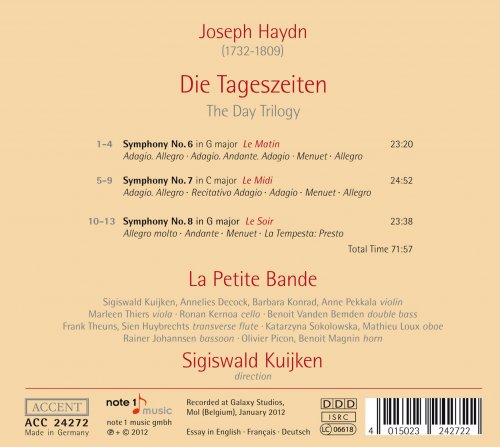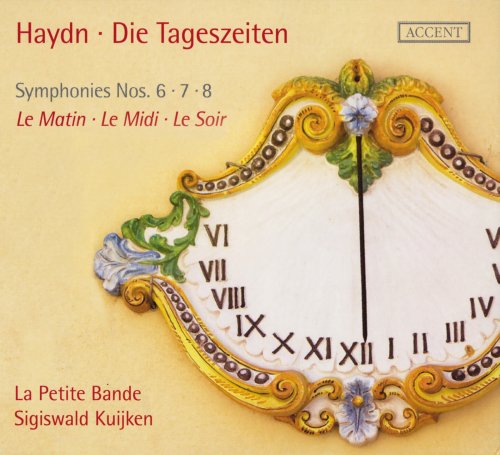
La Petite Bande, Sigiswald Kuijken - Haydn: Die Tageszeiten (2012)
BAND/ARTIST: La Petite Bande, Sigiswald Kuijken
- Title: Haydn: Die Tageszeiten
- Year Of Release: 2012
- Label: Accent
- Genre: Classical
- Quality: FLAC (image+.cue,log,scans)
- Total Time: 01:11:50
- Total Size: 326 MB
- WebSite: Album Preview
Tracklist:
Symphony No. 6 In G Major 'Le Matin'
1 Adagio, Allegro 3:04
2 Adagio, Andante, Adagio 7:04
3 Menuet 4:10
4 Allegro 6:02
Symphony No. 7 In C Major 'Le Midi'
5 Adagio, Allegro 7:53
6 Recitativo, Adagio 2:32
7 Adagio 6:02
8 Menuet 3:41
9 Allegro 4:44
Symphony No. 8 In G Major 'Le Soir'
10 Allegro Molto 5:49
11 Andante 8:03
12 Menuet 4:17
13 La Tempesta: Presto 5:29

Symphony No. 6 In G Major 'Le Matin'
1 Adagio, Allegro 3:04
2 Adagio, Andante, Adagio 7:04
3 Menuet 4:10
4 Allegro 6:02
Symphony No. 7 In C Major 'Le Midi'
5 Adagio, Allegro 7:53
6 Recitativo, Adagio 2:32
7 Adagio 6:02
8 Menuet 3:41
9 Allegro 4:44
Symphony No. 8 In G Major 'Le Soir'
10 Allegro Molto 5:49
11 Andante 8:03
12 Menuet 4:17
13 La Tempesta: Presto 5:29
Haydn's three "daypart" symphonies were composed in 1761, early in the composer's employ at Esterháza castle. They are not heavily programmatic works, with only brief passages in each one suggesting, respectively, morning, noon, and evening. Historical performance techniques for symphonies of this period are hotly debated, with little definitive evidence supporting any particular solution. The early symphony has strong links to small-ensemble works like the divertimento, and veteran Dutch historical-performance specialist Sigiswald Kuijken and his group La Petite Bande seem to rely on that fact with their deployment of the 14-player orchestra heard here. It makes a certain degree of sense, and Kuijken does well by eliminating the harpsichord continuo. But clearly by the time of the Symphony No. 45 in F sharp minor ("Farewell") the orchestra had bulked up considerably, and there's a strong case to be made for a somewhat larger group in Haydn's symphonies of the early 1760s. That's especially true for these three works, whose most distinctive characteristic is a profusion of solo passages for the winds and even for the double bass. Those hark back to the Baroque concerto grosso with the alternation of small and large groups of players. Here, with just one viola, cello, and bass (each violin part has two players), the contrast is lost, and the music seems rather shapeless despite precise playing from the musicians of La Petite Bande. Your mileage may vary, and there may yet come a time when Kuijken's approach is shown to be the right one. But buyers at present should compare closely with recordings of these works by the Heidelberger Sinfoniker under Thomas Fey, or the Freiburg Baroque Orchestra, which uses a larger string section and, for many, will bring the music alive more effectively.

As a ISRA.CLOUD's PREMIUM member you will have the following benefits:
- Unlimited high speed downloads
- Download directly without waiting time
- Unlimited parallel downloads
- Support for download accelerators
- No advertising
- Resume broken downloads


